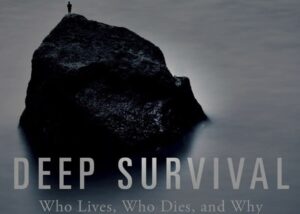By Aoife Brennan, CEO of Synlogic, as part of the From The Trenches feature of LifeSciVC
A couple of years ago, my husband returned from a business trip with a random gift for me. He was running through an airport giftshop when something caught his eye: a book with the title “Deep Survival.” I raised an eyebrow as he handed it to me. I am not exactly an adventure sports type. I admire the exploits of people like biotech-journalist-turned-mountain-climber Luke Timmerman, but I do so from a distance and generally try to avoid putting myself in situations associated with mortal danger.
Despite my initial misgivings, I soon found myself completely absorbed in stories of survival against the odds—tales of individuals who found themselves in extraordinary circumstances but were equipped with the psychological strength to survive. Author Laurence Gonzales, a fantastic storyteller, has studied these accounts and boiled down his observations into lessons that can be applied to many areas of life. I was not surprised to discover that the book is well-known to other biotech CEOs.
I pulled out my copy again recently. With challenges across capital markets, a ‘new normal’ operating model imposed by a global pandemic, uncertain timelines, stretched vendors and supply chains, this is a tremendously difficult period in biotech. Thankfully, there are a number of lessons in “Deep Survival” that can be applied to running a pioneering company in tough times.
The book begins on an aircraft carrier in the Pacific. The pilots who land fighter jets on aircraft carriers at sea are meticulously trained, elite performers. Nevertheless, the experience of landing a jet, in the dark, through wind and high seas, on a surface that is pitching and rolling on multiple axes, puts that training—and the steady nerves that come with it—to the test.
Gonzales finds that most “wipe outs” are anticipated. Often, there are warning alarms going off in the cockpit and a ground-support person shouting in the pilot’s ear to abort. But in many instances pilots in that moment are so focused on achieving the safety of being on-deck that they will zone out all other inputs. Even for these consummate pros, the training and “top gun” selection can fall away in the face of fear.
Gonzales goes on to describe an array of survival stories and highlights interviews with experts on wilderness survival as well as those who have been humbled by a failure to perform in environments for which they had been specifically trained. His findings support a number of actions that can increase the odds of survival—or, in the case of a startup, fiscal sustainability.
- Perceive, believe. In a crisis, survivors have an ability to face the brutal facts of their situation and continue to notice even the smallest details. They cycle through the stages of grief very rapidly, not getting stuck on anger at forces beyond their control. Instead of wallowing in the hopelessness of a situation, they go inward and focus on what they themselves can do.
- Humor breaks the fear cycle. Some fear can be motivating, but too much fear can result in lack of sound judgment and actions that are ineffective or detrimental in a given scenario. Humor can keep survivors calm and out of that negative spiral. Finding something to laugh about and maintaining a sense of humor, even in difficult circumstances, can help improve the odds of a good outcome.
- Rambos are the first to go. Maintaining humility in high-risk situations is paramount. When the environment is continually changing, recognizing and accepting that much is beyond your control makes it more likely that you will appropriately respond to the situation at hand—and increases your odds of survival. Your past clinical research successes, how oversubscribed your last financing was, how much you bench pressed last week… all of that is simply irrelevant noise.
- Don’t miss the beauty. Observing the beauty and celebrating the small things, like a beautiful sunset or data plot, even in the bleakest situations, is critical to maintaining a strong spirit. Celebrating the small wins and the beauty all around is what allows survivors to keep moving forward.
- Surrender. Gonzales finds that survivors manage physical pain well, accepting it, locking it away, and developing an out-of-body mentality as they focus on what needs to be done. He calls this phenomenon “resignation without giving up.” We must acknowledge and lock away pain before we are able to take action to save ourselves and others.
Many of these concepts can be applied to managing our current challenges in biotech for example a team that is defensive and afraid of being blamed for factors beyond their control in achieving an enrolment goal is less likely to come up with a creative work around or solution. In addition, speaking openly about the current macro-economic environment, while focusing on the long-term mission, can help leadership teams build credibility among employees who see their equity under water.
While the odds of being stranded in the Pacific Ocean or crash landing in the middle of the Amazon seem remote most days, building a biotech company in a chaotic market can often feel like maneuvering a fighter jet to a safe landing on an aircraft carrier in stormy seas. Despite the fear and chaos, however, remembering and using our training, maintaining team spirit, recognizing the beautiful (but frequently humbling) complexity of biology, and staying focused on the mission (and fun) of developing life-changing medicines for patients may help us not only survive, but thrive.





